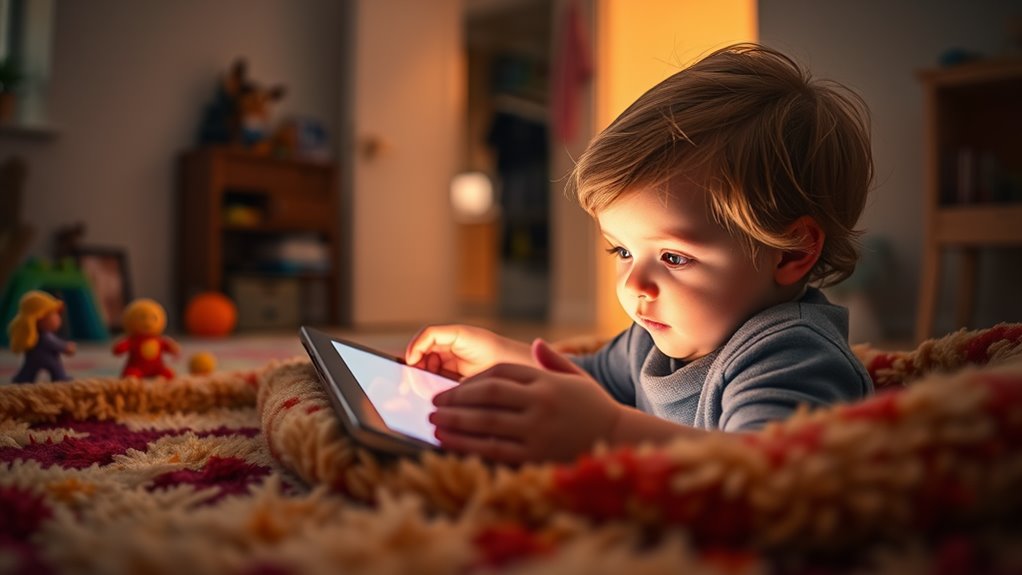Understanding the Effects of Screen Time on Child Development
You might find yourself wondering how screen time impacts your child’s development in today’s digital age. While some screens can offer educational benefits, others may contribute to challenges in physical health and emotional well-being. It’s crucial to recognize how varying amounts of screen exposure affect different developmental stages. Balancing screen time with engaging activities could be key, but what does that balance really look like? Exploring these nuances can help you make informed decisions for your child’s growth and happiness.
Definition of Screen Time
Screen time refers to the amount of time children spend engaging with screens, whether through televisions, computers, tablets, or smartphones. It’s like counting the minutes you’re glued to your favorite video game, binge-watching your latest show, or scrolling through social media.
Today, screens are everywhere, and kids are using them more than ever—sometimes more than you’d want!
When you think about it, screen time can be both fun and educational. It can help kids learn new things, connect with friends, and even release their creative side.
However, it can also lead to some challenges. The more time kids spend staring at screens, the less time they might spend playing outside or reading a good book.
It’s important to keep track of how much screen time your child has. You don’t want them to miss out on the joys of playing catch or building forts in the living room!
Developmental Stages of Children
As children grow, they go through various developmental stages that shape their physical, emotional, and cognitive abilities.
Think of it like climbing a giant tree, with each branch representing a different phase of growth. In the early years, from birth to around two years old, kids are like little sponges, soaking up everything around them. They start crawling, walking, and exploring, which is super significant for their motor skills.
From ages three to six, kids become mini-explorers, using their imaginations like never before. They play pretend, which helps them develop social skills and creativity.
Then comes the school-age phase, where they’re learning not just from books but also from interacting with friends. This is when friendships really start to matter, and social skills become even more essential.
Finally, in the pre-teen years, kids begin to understand more complex ideas and emotions. They might even start questioning everything—like, “Why do I’ve to do homework?”
Steering through these stages can be tricky, but it’s all part of growing up. Just remember, each stage is a building block for who they’ll become!
Positive Effects of Screen Time
Often, digital devices can play a positive role in a child’s development when used wisely. For starters, educational apps and games can make learning fun. You might notice that your child is more engaged when they can interact with colorful graphics or exciting characters. It’s like sneaking in veggies with ice cream—learning disguised as play!
Moreover, screen time can help kids connect with others. Video calls with family or friends can keep them close, especially when they can’t be together in person. They also learn valuable social skills through online games and communities, collaborating and communicating with peers.
Additionally, screens offer a window to the world. When your child explores documentaries, virtual museum tours, or educational videos, they’re discovering new cultures and ideas. This exposure can spark curiosity and creativity, inspiring them to ask questions and seek answers.
Of course, moderation is key. Balancing screen time with outdoor play, reading, and family activities guarantees your child enjoys the benefits without tipping the scale.
Negative Effects of Screen Time
While digital devices can enhance learning and social connections, excessive screen time can lead to several negative effects on a child’s development. Imagine your brain as a sponge; too much screen time can make it feel like it’s soaking in too much water, and it starts to overflow.
One of the biggest issues is that it can limit your child’s ability to engage in face-to-face interactions. When kids spend hours glued to a screen, they miss out on important social skills, like reading body language or sharing a laugh with friends.
Another concern is attention span. If your child constantly switches between games, videos, and apps, they might find it hard to focus on one task, like homework or reading. It becomes a game of “what’s next?” rather than enjoying the moment.
Lastly, excessive screen time can affect sleep patterns. If you’re scrolling through a game or video late at night, it’s easy to lose track of time, making it hard to get the good night’s sleep you need.
Impact on Physical Health
Excessive screen time can have a significant impact on your child’s physical health, affecting everything from posture to fitness levels. When kids spend too much time hunched over their devices, it can lead to bad posture. You might notice them slouching like a tired turtle! This isn’t just uncomfortable; it can cause long-term issues.
Additionally, screen time often replaces active play. If your child’s busy playing video games instead of running outside, they might miss out on important physical activities. This could lead to weight gain and decreased fitness levels. No one wants to be the kid who gets winded chasing after a soccer ball!
Eye strain is another concern. Staring at screens for too long can make their eyes feel tired and sore. You might hear them say, “I can’t see!” even though they aren’t wearing glasses yet.
To keep things balanced, encourage breaks. The 20-20-20 rule is a fun one: every 20 minutes, look at something 20 feet away for 20 seconds.
Influence on Cognitive Skills
Screen time can directly influence your child’s cognitive skills, impacting their ability to think critically and solve problems. When kids spend time playing educational games or watching informative videos, they can boost their memory and attention. However, too much screen time can lead to a decline in these skills.
Imagine a brain workout versus a brain nap; too much screen time can feel like a nap!
Interactive content can help your child learn about cause and effect, which is super important for problem-solving. For instance, games that require strategy can teach them to think ahead and plan.
But if your child spends hours scrolling through passive content, their brains mightn’t get the workout they need, leaving them feeling a bit foggy.
It’s also essential to choose content wisely. Look for age-appropriate programs and games that challenge your child while keeping them engaged.
Remember, balance is key! Encouraging breaks and mixing screen time with hands-on activities can help keep their minds sharp.
Social Development and Screen Time
In today’s digital age, the way children interact with screens can greatly shape their social development. You might think that all this screen time is just about games and videos, but it can actually influence how kids relate to each other. When children spend hours interacting with their favorite apps or shows, they might miss out on real-life social skills, like reading body language or understanding tone of voice. Those face-to-face chats are super important!
Sure, online games can help kids make friends, but they can also lead to misunderstandings. Sometimes, kids might feel more comfortable chatting online than in person, which can make real-life interactions feel a bit awkward. Imagine trying to talk to someone after only ever texting them!
To balance things out, encourage your child to unplug and join in on family dinners, playdates, or sports. These activities can help build their confidence and social skills.
Emotional Wellbeing and Screen Use
Many parents worry about how screen use affects their child’s emotional wellbeing. You might wonder if too much time in front of a screen could lead to feelings of loneliness or sadness. It’s true that spending hours on devices can sometimes make kids feel disconnected from the real world.
When kids are glued to screens, they might miss out on important face-to-face interactions, which can help them build strong emotional skills.
But not all screen time is harmful! Some games and shows can actually promote empathy and teamwork. If your child connects with friends online or engages in educational content, it can boost their mood and help them feel understood. It’s all about balance.
Encouraging your child to take breaks and engage in offline activities can help keep their emotional health in check. Try setting aside time for family activities like board games or outdoor adventures.
Remember, it’s crucial to talk to your kids about what they’re watching or playing. This way, you can help them process their feelings and develop healthy habits that support their emotional wellbeing.
After all, a happy child is a well-rounded child!
Guidelines for Screen Time
While finding the right balance can be challenging, establishing clear guidelines for screen time is essential for your child’s development.
First, think about age-appropriate limits. For kids aged 2 to 5, experts recommend no more than one hour of high-quality programming each day. For older kids, consider setting daily limits that fit your family’s routine.
Make screen time a shared experience. Watching shows or playing games together can help you discuss content and its impact.
Encourage breaks! It’s important to step away from screens every hour to stretch, grab a snack, or just chat.
You might also want to designate certain times as screen-free, like during family meals or before bedtime. This helps everyone unplug and connect more personally.
Lastly, be a role model. If you’re glued to your phone, your child might think that’s how it should be. Instead, show them that reading a book or playing outside can be just as exciting.
Balancing screen time isn’t just about limits; it’s about creating a healthy relationship with technology. With these guidelines, you can help your child navigate their digital world while growing and learning!
Alternative Activities for Children
Exploring alternative activities for children can enrich their development and reduce reliance on screens. Instead of plopping down in front of the TV or tablet, think about fun, engaging ways for your kids to spend their time. Have you tried crafting? It’s a fantastic way to spark creativity! Grab some paper, scissors, and glue, and let their imaginations run wild.
Outdoor play is another great option. Whether it’s riding bikes, playing tag, or simply exploring nature, fresh air does wonders for kids’ moods and energy levels. Plus, it’s a chance for them to make new friends and develop social skills.
If your kids enjoy reading, consider starting a family book club. It’s a cozy way to bond, and you can take turns picking books. Cooking together is another fun activity. Kids love getting involved in the kitchen, and you get to sneak in some valuable life skills!
These activities not only keep kids entertained but also help them learn and grow. So, the next time you hear the dreaded “I’m bored,” you’ll have plenty of fun alternatives to suggest!
Engaging With Technology Together
Engaging with technology together can turn screen time into a valuable bonding experience. Instead of letting your child disappear into a digital world alone, why not join them? You can plunge into their favorite games, apps, or shows and share your thoughts. This not only makes the experience more enjoyable but also helps you understand what they love about it.
When you play a video game together, you’re not just competing; you’re building teamwork skills. Discussing a movie or show can spark conversations about friendships, values, and even silly moments. Plus, you get to show off your own tech skills—who doesn’t love a good “I remember when” story about dial-up internet?
Setting aside time to engage with technology together helps you create lasting memories. It’s like having your own little adventure, even if it’s just on the couch.
Just remember to keep an eye on how much time you both spend staring at screens. Balance is key! So, grab that controller or remote, and let’s make screen time a fun family activity. You might just find yourself laughing together, learning new things, and deepening your bond while exploring this digital age!




